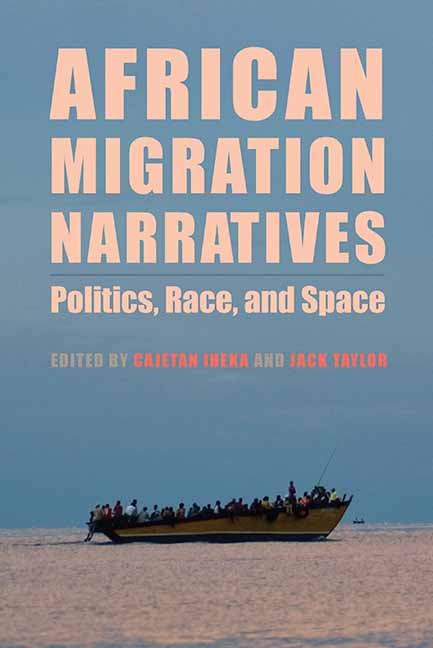Book contents
- Frontmatter
- Contents
- Acknowledgments
- Introduction: The Migration Turn in African Cultural Productions
- Part One African Migration on the Screen: Films of Migration
- 1 Harragas, Global Subjects, and Failed Deterritorializations: The Tragedies of Illegal Mediterranean Crossings in Maghrebi Cinema
- 2 Nollywood Comedies and Visa Lotteries: Welfare States, Borders, and Migration as Random Invitation
- 3 Accented Cinema: The Context of Nollywood
- 4 Migrations and Representations: The Cinema of Griot Dani Kouyaté
- Part Two Forgotten Diasporas: Lusophone and Indian Diasporas
- Part Three Migration against the Grain: Narratives of Return
- Part Four Migration and Difference: Indigeneity, Race, Religion, and Poetry at the Margins
- Bibliography
- Notes on Contributors
- Index
1 - Harragas, Global Subjects, and Failed Deterritorializations: The Tragedies of Illegal Mediterranean Crossings in Maghrebi Cinema
from Part One - African Migration on the Screen: Films of Migration
Published online by Cambridge University Press: 26 July 2019
- Frontmatter
- Contents
- Acknowledgments
- Introduction: The Migration Turn in African Cultural Productions
- Part One African Migration on the Screen: Films of Migration
- 1 Harragas, Global Subjects, and Failed Deterritorializations: The Tragedies of Illegal Mediterranean Crossings in Maghrebi Cinema
- 2 Nollywood Comedies and Visa Lotteries: Welfare States, Borders, and Migration as Random Invitation
- 3 Accented Cinema: The Context of Nollywood
- 4 Migrations and Representations: The Cinema of Griot Dani Kouyaté
- Part Two Forgotten Diasporas: Lusophone and Indian Diasporas
- Part Three Migration against the Grain: Narratives of Return
- Part Four Migration and Difference: Indigeneity, Race, Religion, and Poetry at the Margins
- Bibliography
- Notes on Contributors
- Index
Summary
Whether seeking refuge from political turmoil or economic calamity, immigrants who are forced to embark on hazardous journeys across the Mediterranean Sea often end up dead. For example, the fourteen-mile stretch of sea separating Tangiers, Morocco, from the southern tip of Spain (a pathway of choice for those seeking better socioeconomic and political situations in Europe) has, since the beginning of this century, become a quotidian deadly route. Migrants’ bodies routinely wash up on Spanish shores or back on the beaches of the Maghreb (Algeria, Morocco, and Tunisia). The horrors of illegal crossings have been repeatedly evoked in written texts and films most noticeably since 2000, as the death toll has increased due to sociopolitical and economic unrest across Africa and the Middle East. In 2016, from Libya alone, more than twenty-one hundred people died trying to cross the sea to escape war. This number, juxtaposed to those officially published by Morocco, Algeria, and Tunisia, paints a picture of hopelessness. The harragas, as they are called in Arabic, are of all colors and religions, from the Maghreb and as far south as Senegal, Mali, and Mauritania. In his work, Ex-Centric Migrations: Europe and the Maghreb in Mediterranean Cinema, Literature, and Music, Hakim Abderrezak explores in depth the connotations of the term harraga. He explains that the noun harragas (plural), the subject of the works of many Maghrebi authors and filmmakers, is a dialectical Arabic deformation of the standard Arabic hrig and harga, which mean burning. Different transcriptions include: lahrig, l'hrig, el hrig, h'rig, harq, and hrague. Abderrezak writes, “Hrig covers the clandestine migrant's 1.) burning desire to leave, 2.) burning of kilometers to the final destination, and 3.) burning identification papers in hopes to make repatriation more difficult for authorities.” As Abderrezak further explains, leaving “one's country clandestinely and the desire to do so are often designated by the terms hrig and harga.” Indeed, a whole vocabulary associated with the harragas has made its way into the contemporary narratives of illegal migration taking place in the Mediterranean basin. Words such as clandestins (French), clandestinos (Spanish) as well as pateras (Spanish) and barques (French), both meaning small fishing boats used to transport the harragas, have all become common terminology used to describe illegal crossings of the Mediterranean Sea.
- Type
- Chapter
- Information
- African Migration NarrativesPolitics, Race, and Space, pp. 19 - 38Publisher: Boydell & BrewerPrint publication year: 2018

